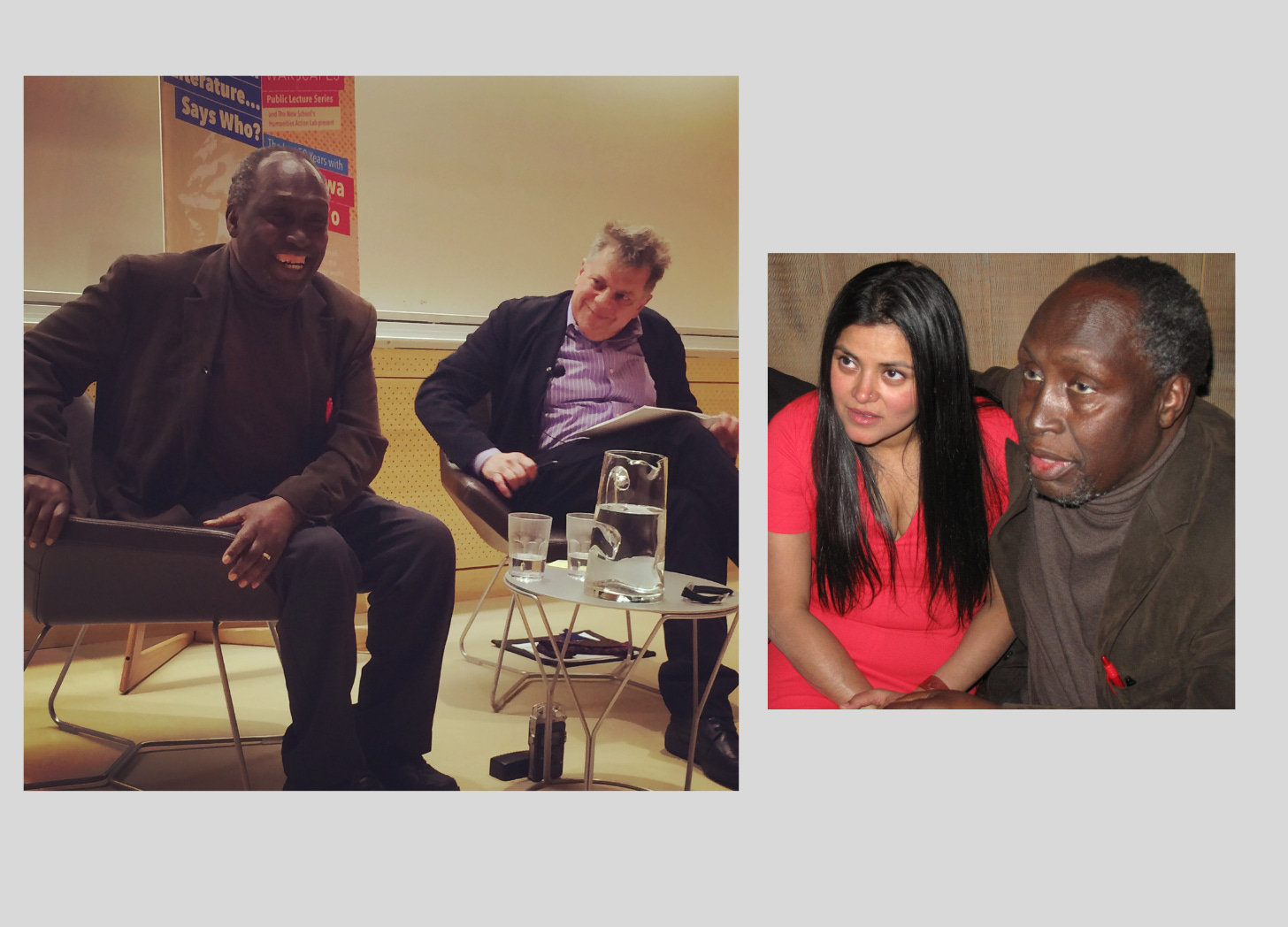Haphazard notes on mourning Ngũgĩ wa Thiong'o.
Literary giant, intellectual, and dissident Ngũgĩ wa Thiong'o passed away on May 28, 2025. He leaves us with a mountain of ideas filed away in hundreds of essays, books, lectures and conversations.

When Meg texted me the news that Ngũgĩ was no more, I felt a physical sense of shock. As I read his daughter Wanjiku’s Facebook post, tears poured out of me and I could not understand why I would be crying for Ngũgĩ. I knew he was 87 years old and in frail health. Certainly, he was beloved to me and had changed the course of my thinking and writing, but I was not personally very close to him like so many people I knew in the African literary world. Only a year ago, Ngũgĩ’s son Mukoma had revealed that his mother had been physically abused by his father, news that had upset the African literary community, in particular. The mourning began to feel fraught even as the loss was resounding.
Michael had anticipated I would start looking for photos from our magical evening with him in New York City for a Warscapes event, and he found them right away. I suddenly missed Monica Popescu, a dear friend who had passed away last year from cancer. She was a brilliant Ngũgĩ scholar and was working on a literary biography of him. We always spoke about how the Nobel prize committee will never give someone as fiercely political as Ngũgĩ that prize. We would cackle year after year when the papers and social media erupted with vehement calls to give Ngugi the Nobel. When he didn’t win, we liked declaring our told-you-so’s while swatting away our twinge of disappointment. Despite our killjoy theories on literary politics, our hearts always craved that gargantuan global prestige for him.
When I told Meg that I miss Monica, she wrote, “God, grief is one thread.” As news traveled quickly, Suchitra called to see how I was doing. I said I don’t understand why I’m crying so much. She said, of course, he meant something to you but the world is also an absolute horror show right now. Grief really is one thread. And Suchitra was right. I was experiencing an accumulation of grief for worlds vanishing before our eyes. Gaza, Monica, Ngũgĩ… the feeling that everything was ending. Everything moral and good in the world was ending. It was somehow even more wrenching to me that my partner and my friends, people who are also profoundly marked by the unending Palestinian tragedy, were making room for me to have this moment of indulgent grief.
Last week, we crossed 600 days of genocide, war and devastation in Gaza. There are many words to describe how utterly horrifying it has become. But words have begun to fail me. And yet, the body manifests waves of feelings from shock to fury to despair to numbness. As Israel starves Gazans with a sick, strategic cruelty, daily banalities like eating or bathing suddenly become weighted with despair and guilt. When I heard the news of Ngũgĩ’s passing, the floodgates must have opened.
Someone sought out a statement from me on Ngũgĩ’s death. Forced to now reflect, I realize it is the end of an era because he was the last of the writers for whom literature and politics were inextricable. He belonged to that rapidly dying breed for whom writing was never an individual or professional pursuit, it was meant to serve a common good. Ngũgĩ wanted to educate us and open our eyes to how the world works. He certainly reflected on craft, storytelling and writing processes but it was without the hollow, narcissistic and apolitical musings on how to write perfect sentences that the literary world is saturated with these days.
Politics and literature, the politics of literature, literature as politics, literature of politics, literature as resistance, literature as dissidence, literature for the people…I can only string these ideas together because of Ngũgĩ. But my grand debt to Ngugi is the almost tactile understanding of what exactly is colonialism and how it dwells within us and all around us. I first came across decolonization as a term and as violent political process in the writings of Frantz Fanon but it was the thinking on the act of “decolonizing” that Ngũgĩ’s writings hammered into me. I have since written, spoken and edited books about this so no need to carry on further except to say that there is work to be done, and political, economic, social and psychological decolonization is yet to be achieved. Thanks to Ngũgĩ, I stand firm on the belief that dislodging our inherently colonial mindset is the only way forward for our ailing world.
There are so many beautiful tributes and obituaries getting published about this lovely man whose words, warmth and intellect touched so many. Social media is evidence of an avalanche of love for him. People are posting unique and previously unseen photographs with him, a testament to Ngũgĩ’s sweetness and patience to chat and hang out and laugh and ask to learn words in your language and allow photos to be taken with him everywhere he went.
May Ngũgĩ wa Thiong'o (1938-2025) rest in peace, beauty and power.
Love and solidarity❤️🔥
Bhakti Shringarpure
Recent publications
How to Be a Queer, Anti-Zionist, Pro-Palestinian Jew: Featuring Sim Kern
Sim Kern’s journey as an outspoken and empathetic activist for Palestinian liberation began when they realized, as a teenager, that global warming would blow up our planet one day. Back in 1999, saving the environment was not a “mainstream” topic. For Sim, these early climate justice concerns became an entry point for understanding that our global syste…
UCop: A Small Town Tale of Big Cop Ambitions
The last 20 months of Israel’s genocide in Gaza and the protests that have followed have laid bare the workings, intentions and sheer violence that American universities are capable of unleashing on their own students and faculty. The prioritization of wealth, the embrace of border regimes, an illogical worship of Isra…





Please note that while Ngugi's son made an accusation, all his other children responded publicly with an immediately denial, and the charge was unfounded enough that al-Jazeera retracted an article by a guest columnist that highlighted the charge. It's important not to assume any accusation is automatically credible. We owe Ngugi and everyone full due diligence before repeating such charges, especially when there is no corroborating evidence and the alleged victim's own words - in this case his then wife's in published interviews - rebuts it.
Please note that while Ngugi's son made an accusation, all his other children responded publicly with an immediately denial, and the charge was unfounded enough that al-Jazeera retracted an article by a guest columnist that highlighted the charge. It's important not to assume any accusation is automatically credible. We owe Ngugi and everyone full due diligence before repeating such charges, especially when there is no corroborating evidence and the alleged victim's own words - in this case his then wife's in published interviews - rebuts it.